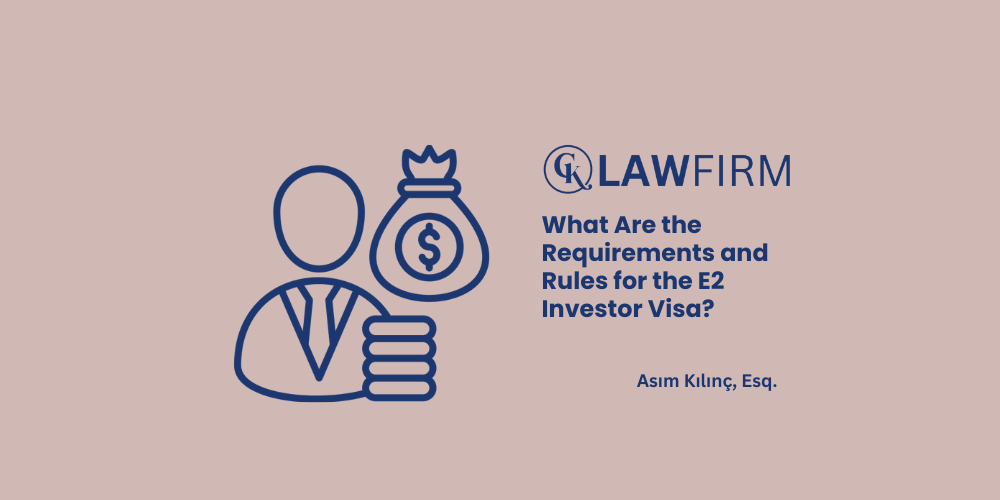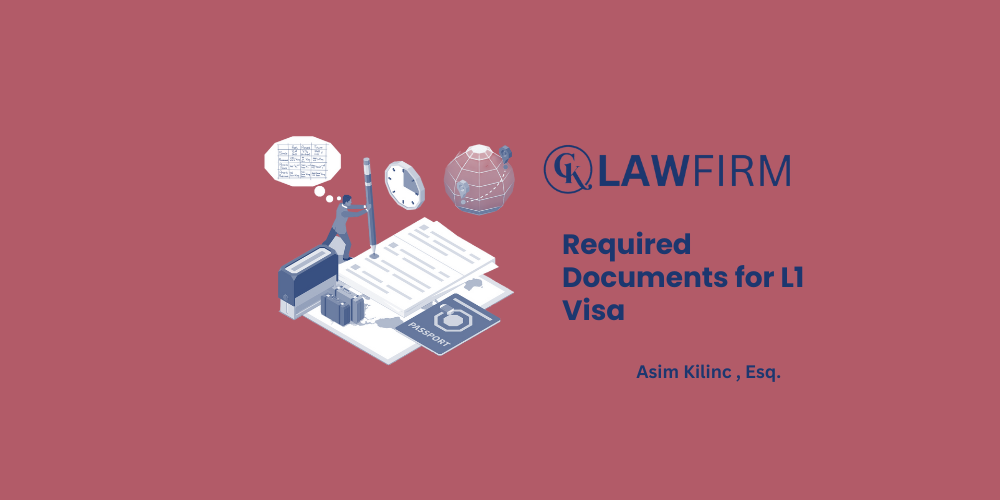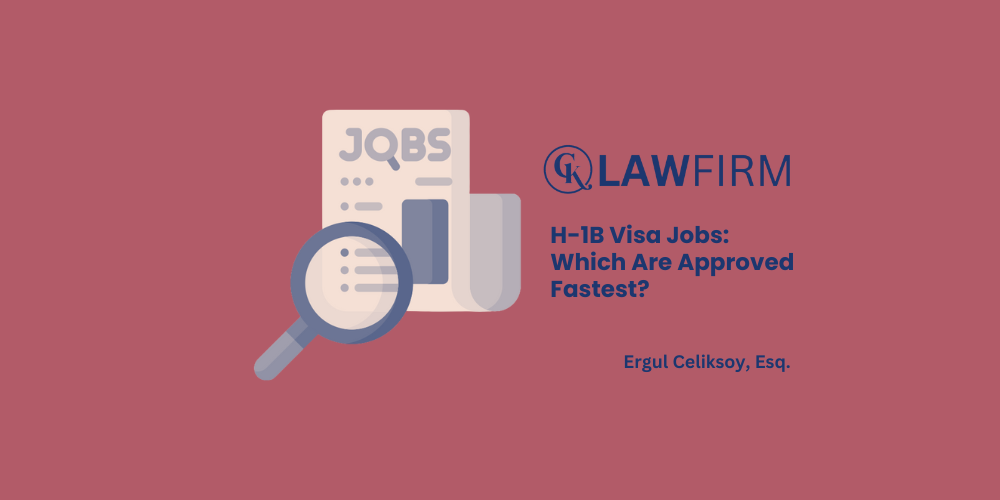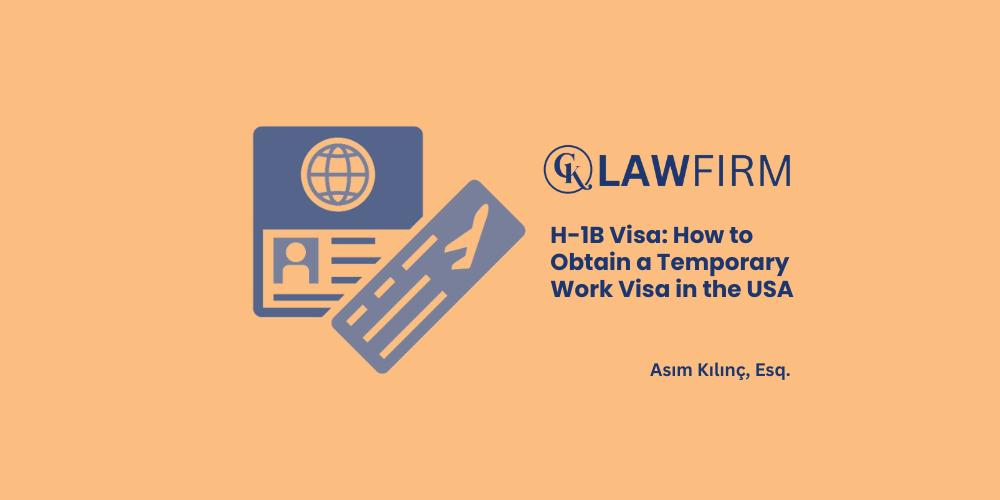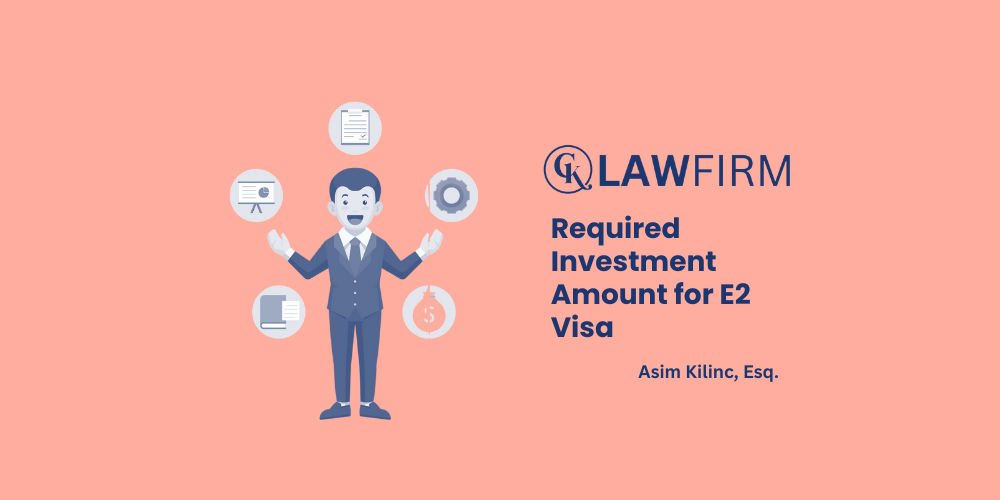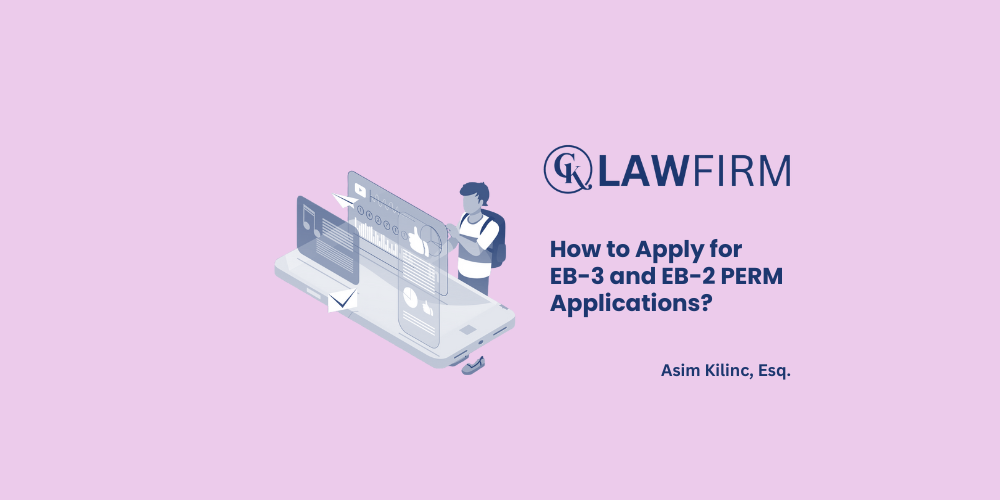Schedule an Appointment with Our Attorneys Now
Asım Kılınç, Immigration Attorney, CK Law Firm
The E2 Investor Visa is one of the most popular options for foreign nationals who want to start a business or invest in the United States. This visa offers citizens of specific countries the opportunity to engage in commercial activities and establish a business in the U.S. With the E2 Investor Visa, it is possible to relocate to the U.S. and grow your business. However, there are certain E2 visa requirements and rules that must be followed during the application process. In this blog, we will cover the following topics:
- What is the E2 Investor Visa?
- Requirements for the U.S. E2 Investor Visa
- Rules for the U.S. E2 Visa
- How Much Investment is Needed for the E2 Visa?
- Living in the U.S. with an E2 Visa
- Is it Possible to Obtain a Green Card with an E2 Visa?
We provide detailed information on these topics. If you have any other questions or specific issues, you can always reach out to us via our website. You can also contact me directly on LinkedIn. Enjoy reading!
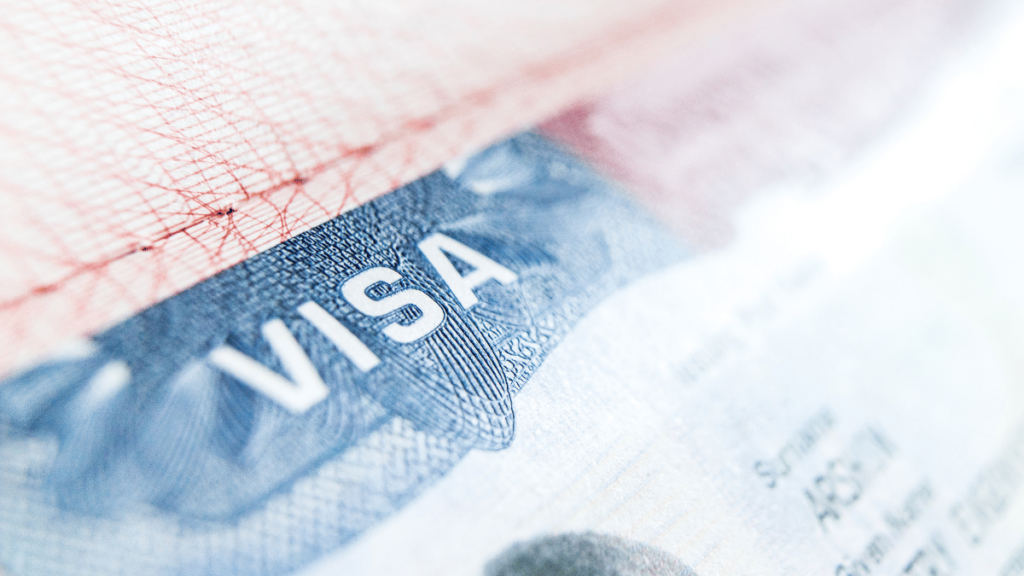
What is the E2 Investor Visa?
The U.S. E2 Investor Visa is a visa type that grants citizens of countries that have a trade and investment agreement with the U.S. the right to make a substantial investment and establish a business in the U.S. This visa is only available to applicants from designated countries, and there are specific conditions that must be met in order to apply.
Requirements for the U.S. E2 Investor Visa
To apply for the E2 visa, the following E2 visa conditions must be met:
- Nationality Requirement: The applicant must be a citizen of a country that has a trade agreement with the U.S.
- Investment Amount: The investment must be “substantial.” Typically, an investment between $100,000-$150,000 USD is recommended, although the amount can vary depending on the nature of the business.
- Active Business: The investment must involve an active commercial enterprise, not a passive income-generating activity. For example, opening a restaurant or store.
- Control Ownership: The applicant must have control over the business and own at least 50% of the company.
- Job Creation: The investment must contribute to the U.S. economy and have the potential to create jobs for U.S. citizens.
- Temporary Intent: While the applicant may plan to stay in the U.S. with an E2 visa, they must show the intention to return to their home country once the visa expires.
Rules for the U.S. E2 Visa
After obtaining the E2 investor visa, there are specific U.S. E2 investor visa rules that you must follow:
- Business Continuity: The business must remain operational, and the investment must be protected.
- Duration and Renewal: The E2 visa is typically valid for 2 to 5 years and can be renewed as long as the investment continues.
- Family Members: The spouse and children under 21 of the E2 visa holder can also live in the U.S. under the same visa, and spouses can apply for work authorization.
- Visa Purpose Compliance: The E2 visa only permits working at the invested business. Working for another employer is prohibited.
How Much Investment is Needed for the E2 Visa?
The required investment for the E2 visa application is not explicitly defined. However, the investment must be “substantial” and sufficient to sustain the business. Typically, an investment between $100,000 and $150,000 USD is advised. However, the amount can vary based on the type and size of the business.
- Small Businesses: For smaller businesses like a café or consulting firm, an investment of $100,000-$150,000 USD may be sufficient.
- Larger Businesses: For larger, capital-intensive businesses, the investment could exceed $300,000 USD.
The E2 visa investment amount must be large enough to ensure the business’s viability and contribute to the U.S. economy.

Living in the U.S. with an E2 Visa
The E2 Visa offers numerous opportunities for entrepreneurs to start a business and live in the U.S. The supportive business environment fosters innovation and offers access to global markets. The U.S. presents a particularly appealing destination for small and medium-sized enterprises (SMEs) due to its efficient market and global customer base. Additionally, living in the U.S. offers opportunities to experience cultural diversity and build a broad network in the business world.
Cost of living varies depending on the state and city chosen. Metropolises like New York and California have higher living costs, while states like Texas or Florida offer more affordable options. Entrepreneurs should be knowledgeable about tax regulations and business laws to manage their enterprises sustainably. Planning for essential needs like healthcare and education is also critical to enhancing the quality of life in the U.S.
Is it Possible to Obtain a Green Card with an E2 Visa?
Although this visa does not directly grant permanent residence, there are pathways to obtaining a Green Card:
- EB-5 Investor Program: By increasing your investment and investing at least $800,000 USD, you can apply for an EB-5 visa.
- Employer Sponsorship: After expanding your business to a certain level, you can apply for a Green Card through employer sponsorship.
- National Interest Waiver (NIW): If your economic contribution to the U.S. is significant, you may apply for a Green Card through the NIW program.
The U.S. E2 Investor Visa is an excellent opportunity for entrepreneurs who wish to start a business and engage in long-term commercial activities in the U.S. However, it is essential to adhere to the E2 investor visa requirements and rules during the application process, prepare all necessary documentation, and proceed with a sound strategy.
If you are looking to make a fresh start in the U.S. with the E2 visa and create opportunities as an investor, we have shared essential details about the process in this article. Successfully completing this process requires a proper strategy and professional preparation. CK Law Firm can guide you through this process. For more detailed information, you can contact us through our official website. If you have any questions, feel free to reach out to me directly via LinkedIn.
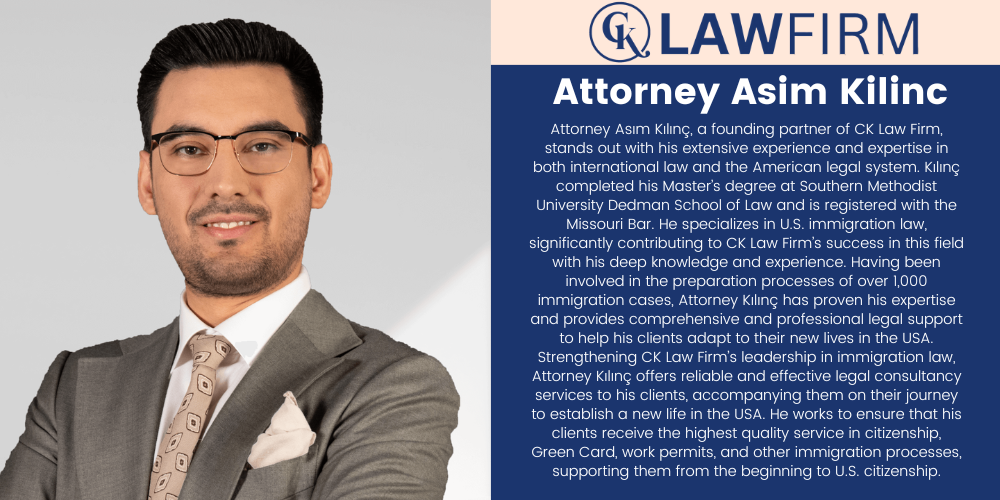
By Asim Kilinc, Immigration Attorney at CK Law Firm
The L1 visa is a special type of visa that allows international companies operating in the United States to temporarily transfer certain employees to the U.S. This visa is particularly suitable for individuals working in executive, managerial, or specialized knowledge positions. Applying for an L1 visa requires comprehensive document preparation. It is crucial to know what documents are needed to complete the application process smoothly. In this article, we will detail all the documents that must be prepared for the L1 visa application process:
- Passport: Validity and Other Requirements
- DS-160 Form: The Foundation of the Application Process
- Biometric Photograph: Specific Standards and Requirements
- Employer-Provided Documents: Assignment Letter and Company Information
- Work Experience and Educational Documents: Proof of Professional Background
- U.S. Accommodation Details: Lodging Arrangements
- Proof of Payment for the Application Fee: Financial Requirements
- Additional Documents: Other Documents That May Be Requested by the Consulate
If you have any other questions regarding the L1 visa type, please do not hesitate to contact me through the comments section below this article, directly via LinkedIn, or through the CK Law Firm Immigration Law Firm website, where I am a co-founder.
Passport: Validity and Other Requirements
Individuals applying for an L1 visa must have a passport that is valid for at least six more months from the date of entry into the United States. The condition of the passport is also crucial; worn or damaged passports may not be accepted. In addition to the current passport, any old passports should also be submitted if available, as they may be important for documenting the applicant’s travel history and previous visa issuances.
DS-160 Form: The Foundation of the Application Process
The DS-160 form is an online form that must be completed by anyone applying for a U.S. visa. This form includes the applicant’s personal information, purpose of travel, plans in the U.S., and visa history. It is critical that the form is filled out completely and accurately, as it plays a key role in the success of the application process. Once the DS-160 form is completed, the confirmation page should be printed out and presented during the visa interview. The information provided in the form must be consistent with other documents submitted during the application process.
Biometric Photograph: Specific Standards and Requirements
A biometric photo that meets specific standards is required for the L1 visa application. The photo must adhere to the following specifications:
- Size: The photo must be 5×5 cm.
- Background: The background of the photo must be white.
- Recency: The photo must have been taken within the last six months.
- Facial Expression: The photo should feature a neutral facial expression, and the entire face must be visible.
A digital copy of this photo should be uploaded online with the DS-160 form, and a printed copy must be presented during the visa interview.
Employer-Provided Documents: Assignment Letter and Company Information
The individual applying for the L1 visa must obtain certain documents from their employer. These documents are a critical part of the application because they prove to U.S. authorities that the applicant is truly eligible for the L1 visa. The required documents typically include:
Assignment Letter: This document should clearly state that the applicant will be working at a U.S. office and specify the position they will hold. Additionally, it should explain the significance of this position within the company and why the applicant was chosen for this role. The letter is usually signed by a senior executive of the company.
Company Activity Documents: Documents proving that the applicant’s employer is operating both in the U.S. and internationally must be submitted. These documents should demonstrate that the company is legally operational, has a physical office in the U.S., and that this office is active.
Company Tax Documents: Documents showing that the company operating in the U.S. has regularly paid its taxes should also be included in the application file. These documents prove that the company is financially sound and legally established.
Work Experience and Educational Documents: Proof of Professional Background
The individual applying for the L1 visa must submit documents proving that they have worked for at least one year within the last three years before the application date. These documents should demonstrate that the applicant has the necessary qualifications for the position:
Work Certificate: This document, issued by the company’s human resources department, should state how long the applicant has worked at the company, the positions they have held, and the responsibilities they have taken on. This document is a crucial piece of evidence showing that the applicant is eligible for the L1 visa.
Diplomas and Certificates: The applicant’s educational qualifications and professional certifications must also be submitted. These documents demonstrate the applicant’s expertise and competence in their field. It is especially important for technical positions that these documents are complete and detailed.
U.S. Accommodation Details: Lodging Arrangements
The applicant must provide information about where they will stay in the U.S. This could be a hotel reservation, a rental agreement, or an invitation letter from a host in the U.S. Lodging arrangements are an important detail that shows the applicant will reside in the U.S. legally and properly.
Proof of Payment for the Application Fee: Financial Requirements
A specific fee must be paid when applying for the L1 visa. This fee is an official part of the application process, and proof of payment must be included in the application documents. If the fee is not paid, the application process cannot be completed, and the application may be denied. Therefore, it is crucial to ensure that the fee is paid in full and on time.
Additional Documents: Other Documents That May Be Requested by the Consulate
During the application process, consulate officials may request additional documents. For example, bank statements to provide information about the applicant’s financial situation, sponsor letters provided by the U.S. employer, or documents specifying how long the applicant will stay in the U.S. may be requested. These documents help prove that the applicant will legally reside and work in the U.S.
Conclusion
The L1 visa application process requires careful preparation and detailed document submission. It is essential that the documents are complete, accurate, and consistent to successfully complete the application process. Given the complexity of the process and legal requirements, it may be helpful to seek support from an immigration lawyer. Remember, you can reach out to me directly via LinkedIn, or through the CK Law Firm Immigration Law Firm website at info@cklawfirm.org.
Who is Attorney Asım Kılınç?
Attorney Asım Kılınç is the co-founder of CK Law Firm and is recognized for his expertise in immigration law and U.S. asylum applications. Kılınç completed his Master’s degree at Southern Methodist University Dedman School of Law and is a member of the Missouri Bar Association, with a focus on U.S. immigration law.
Attorney Kılınç’s extensive knowledge and experience in immigration law have significantly contributed to CK Law Firm’s success in this field. He has actively participated in the preparation of over 1,000 cases, demonstrating his expertise in this area. By providing comprehensive and professional legal support to his clients, he helps them adapt to their new lives in the U.S.
Attorney Kılınç is also well-versed in U.S. asylum applications. He meticulously guides his clients through the process and ensures they receive the best legal advice. He provides top-quality service to clients in matters of citizenship, Green Card, work permits, and other immigration processes, supporting them from start to finish on their journey to U.S. citizenship.
Attorney Asım Kılınç, who solidifies CK Law Firm’s leadership in immigration law and U.S. asylum applications, offers reliable and effective legal consultancy services to clients, assisting them in building a new life in the U.S.
By Ergul Celiksoy, Immigration Attorney at CK Law Firm
The H-1B visa is a gateway to opportunities for Turkish professionals aiming to build a career in the United States. However, there are specific considerations Turkish experts should keep in mind during this process. In this article, I will share insights into which occupations qualify for this visa and which are most quickly approved. Here are the topics I’ll be covering to help you successfully navigate your application:
- H-1B Visa: Your Key to Working in the U.S.
- Jobs You Can Work with an H-1B Visa
- H-1B Visa Basic Fees
- Working in the U.S. with an H-1B Visa: Advantages
I’ll address the above topics in detail, but if you have additional questions, feel free to ask in the comments section of this blog or reach out via our website. For inquiries on other topics, you can also connect with me directly on LinkedIn.
H-1B Visa: Your Key to Working in the U.S.
The H1B visa provides temporary work authorization for foreign professionals seeking employment in specialized fields in the United States. While it is most commonly associated with STEM fields (Science, Technology, Engineering, and Mathematics), it also offers opportunities in other sectors such as healthcare, finance, and academia.
How Long is the H-1B Visa Valid?
The question of how long the H-1B visa is valid is an important one, as it helps determine how long you can continue your career in the United States. Initially, the H-1B visa is issued for a period of three years. However, it can be extended up to six years when necessary. Additionally, you have the opportunity to transition your H-1B visa to a Green Card with the help of your sponsor, granting you permanent residency in the U.S.
Jobs You Can Work with an H-1B Visa
Knowing which professions qualify for the H-1B visa is crucial for navigating the application process effectively. Here are some of the key H-1B visa jobs:
1. Technology and Software Industry
One of the most in-demand fields in the U.S. is the technology sector. Key professions in this industry include:
- Software Engineer
- Data Scientist
- Artificial Intelligence Specialist
- Cybersecurity Analyst
Tech giants like Google, Amazon, and Microsoft hire thousands of professionals in technology-related fields annually through the H-1B visa program. For experts in these areas, building strong connections with these companies can significantly streamline the application process.
2. Engineering Fields
The demand for engineering professionals in the U.S. has grown due to infrastructure projects and industrial development. This provides opportunities for experts in engineering to apply for the H-1B visa. Key specialties in this field include:
- Chemical Engineer
- Electrical Engineer
- Mechanical Engineer
- Civil Engineer
3. Healthcare
The healthcare sector is one of the most critical industries in the U.S., as it is globally. This creates opportunities for healthcare professionals to apply for the H-1B visa. Key roles in this sector include:
- Doctors
- Nurses
- Biomedical Researchers
- Medical Technology Specialists
4. Finance and Business
International companies in the U.S. place significant value on skilled professionals in finance and business. Experts in these fields can secure opportunities to work in the U.S. through the H-1B visa. Prominent roles in this sector include:
- Financial Analyst
- Accounting Specialist
- Business Strategist
- Project Manager
5. Academic Fields
The U.S. is a global hub for academic and research projects, offering significant opportunities to professionals in these areas through the H-1B visa. Individuals with the following titles are particularly sought after:
- University Professors
- Research Assistants
- Academic Advisors
Which Professions Get Approved Faster?
Certain H-1B visa occupations are prioritized and receive approvals more quickly. Here are the professions and the reasons they often experience expedited processing:
- Software Developers and Data Scientists: The technology sector leads in H-1B visa approvals due to high demand.
- Healthcare Professionals: Doctors and nurses are prioritized because of the critical healthcare needs in the U.S.
- Engineers: Electrical and civil engineers often have high approval rates due to their vital role in infrastructure and development projects.
- Researchers: Professionals working in universities and private research institutions frequently benefit from expedited processing due to their contributions to academia and innovation.
H-1B Visa Basic Fees
The H-1B visa fees are primarily the responsibility of the employer. While applicants are expected to cover personal expenses, the official procedural costs are borne by the sponsoring employer. These costs include:
- Application Fee: $460
- Anti-Fraud Fee: $500
- Education and Workforce Fee: $750–$1,500 (varies based on employer size)
- Premium Processing Fee: $2,500 (optional for expedited processing)
Employers are legally prohibited from passing these costs onto the employee. Regulations clearly state that sponsors must cover these expenses. For a more detailed breakdown of H-1B visa cost, refer to our article, “How Much Does H-1B Visa Cost? (Detailed Pricing).”
Working in the U.S. with an H-1B Visa: Advantages
Holding an H-1B visa offers several benefits for professionals working in the United States, including:
- International Career Opportunities: Access to unparalleled opportunities in the global job market of the U.S.
- Family Accompaniment: H-1B visa holders can have their spouses and children join them in the U.S. under the H-4 visa.
- Professional Development: Extensive opportunities for academic and career growth.
The advantages of the H-1B visa go beyond these. It also allows you to apply for a Green Card. With employer support, you can begin the process to secure permanent residency while working legally in the U.S. Once you obtain a Green Card, you gain permanent residency and the ability to apply for U.S. citizenship.
In this article, I have explored key professions eligible for the H-1B visa. If you have any questions about this topic, feel free to leave a comment on this blog or contact us through the official CK Law Firm website. For discussions on specific topics, you can also reach out to me directly on LinkedIn.
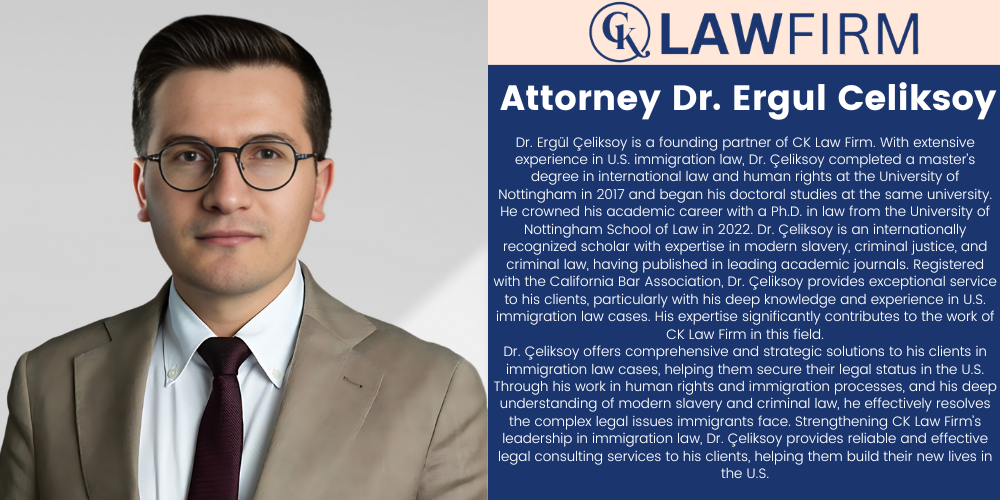
Asım Kılınç, Immigration Attorney, CK Law Firm
With the H1B visa, professionals can take their expertise global and gain temporary work visa authorization in the United States. Designed specifically for individuals working in specialized fields, this visa can be obtained with proper planning and documentation. In this article, I will explore the following topics related to the H-1B visa:
- What is the H-1B Visa, and Who is It For?
- How to Obtain an H-1B Visa: Step-by-Step Process
- H-1B Visa Application Dates and Quotas
- Special Documents Required for the H-1B Visa
- What You Need to Know About Working with an H-1B Visa
If you have questions beyond these topics, feel free to reach out through the comments section of this blog or via the CK Law Firm official website. For personalized inquiries or consultancy services, you can also connect with me directly on LinkedIn.
What is the H-1B Visa, and Who is It For?
The H-1B visa is a temporary work visa designed for professionals seeking employment in specialized fields in the United States. It typically targets individuals working in areas requiring technical expertise or specialized knowledge, such as software development, engineering, medicine, and finance.
H-1B visa holders are initially granted a three-year work authorization in the U.S., which can be extended to a maximum of six years without reapplying. To qualify for an H-1B visa, you must have a job offer from a U.S.-based company that agrees to sponsor your application.
How to Obtain an H-1B Visa: Step-by-Step Process
Applying for an H-1B visa involves a series of procedures. By following the essential steps, you can secure a work visa and continue your professional journey in the United States. Here are the key steps in the process:
1. Secure a Job Offer from a U.S. Company
The first and most crucial step is obtaining a job offer from a U.S.-based company. The company will act as your sponsor, initiating the temporary work visa application process on your behalf. Therefore, securing a job offer is the starting point for applying for a work visa. For more details, you can refer to our article, “Guide to Finding an H-1B Visa Sponsor“
2. Obtain Labor Condition Application (LCA) Approval
Your employer must acquire an LCA from the U.S. Department of Labor. This document certifies that the job has been designed in a way that does not negatively impact U.S. workers and ensures fair conditions for the sponsored employee.
3. Prepare and Submit Form I-129
Your employer will file Form I-129 (Petition for a Nonimmigrant Worker) with USCIS on your behalf to initiate the H-1B application process. This form includes details about your job offer, whether the position requires specialized knowledge, and the salary you will receive. Accurate and complete submission of this form is crucial for the success of your application.
4. Pay the Application Fees
The costs associated with the H-1B visa application are covered by your employer. These fees vary depending on the type of application but typically range from $750 to $4,500. The required H1B visa fees are:
- Application Fee: $460
- Anti-Fraud Fee: $500
- Education and Workforce Fee: $750–$1,500 (based on the size of the employer)
- Premium Processing Fee (optional): $2,500 (for expedited processing)
It is the employer’s responsibility to cover these costs, ensuring the application is filed correctly and promptly.
5. Attend the Consulate Interview
Once your application process is complete, you must attend an interview at the U.S. consulate. During the interview, you will be asked questions about your job offer, documentation, and the purpose of your visa. To ensure a smooth interview experience, it is essential to:
- Prepare all required documents thoroughly and ensure they are complete.
- Practice your responses to potential questions in advance.
Being well-prepared will increase your confidence and improve the chances of a successful interview.
H-1B Visa Application Dates and Quotas
The H-1B visa application period follows a specific annual timeline, typically starting in the first week of April. Applications remain open until the predetermined cap is reached. The U.S. allocates its annual H-1B visa cap to accommodate 85,000 professionals, distributed as follows:
- 65,000 Visas: Reserved for standard applications.
- 20,000 Visas: Allocated for applicants holding a master’s degree or higher.
Due to the rapid filling of these quotas, it is crucial to submit your application as early as possible. Additionally, ensuring that all required preparations are completed before the application period begins is essential for a smooth and timely submission.
Special Documents Required for the H-1B Visa
Preparing the special documents is a critical part of the H-1B visa application process. Missing or incomplete documentation can result in delays or even denial of your visa. To avoid such issues, ensure the following documents are ready:
- Passport: A valid passport that has not expired.
- Diploma and Academic Transcripts: Graduation certificate and transcripts from your educational institution.
- Employer Offer Letter: A formal document detailing the job offer provided by your employer.
- LCA (Labor Condition Application): An approved certification obtained by the employer.
- Form I-129: The primary form used for the H-1B visa application process.
- Photograph: A biometric photo meeting U.S. visa standards.
Foreign professionals must ensure that their documents are accompanied by notarized English translations. Therefore, it is essential that all your documents are prepared in English to meet the H-1B visa application requirements.
What You Need to Know About Working with an H-1B Visa
As an H-1B visa holder, you are legally authorized to work in the United States and, under certain circumstances, you can transition your visa to a Green Card. Additionally, your spouse and children can accompany you to the U.S. on an H-4 visa. Beyond this, the H-1B visa provides several other benefits:
- Protection of employee rights.
- The ability to change employers under specific conditions.
- Opportunities for academic and professional development.
The H-1B visa is a valuable opportunity for individuals aiming to build a career in the U.S. However, completing this process successfully requires careful planning. With the right documents, a qualified employer, and timely submission, you can obtain a temporary work visa.
If you have any questions, feel free to leave a comment below this blog or contact us through our website. For personalized inquiries or to benefit from my consultancy services, you can also connect with me on LinkedIn.
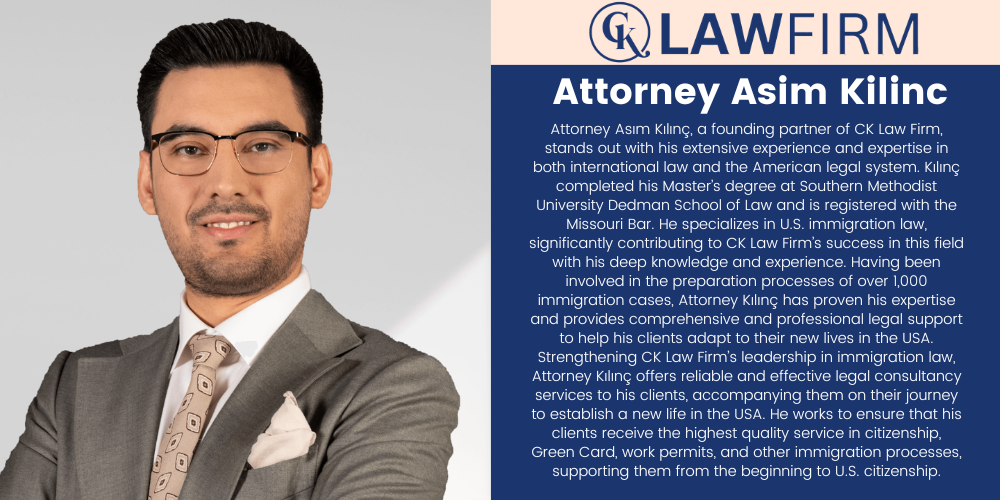
By Asim Kilinc, Immigration Attorney at CK Law Firm
The E2 visa offers a unique opportunity for entrepreneurs who want to establish a business in the United States through investment. This type of visa is available to citizens of countries that have a trade agreement with the U.S. and is ideal for those who wish to start a business or invest in an existing one. However, there are specific requirements to apply for this visa, with the “required investment amount” being one of the most critical factors. In this article, I will address the most frequently asked questions about the required investment amount for an E2 visa. By reading this article, you will find answers to the following questions:
- What is an E2 Visa?
- How Much Should the Required Investment Amount Be for an E2 Visa?
- What Does It Mean for the Investment to Be “Substantial”?
- What Are the Requirements for the Source of the Investment and How Should the Investment Be Made?
- The Condition that the Investment Must Be Irrevocable
- E2 Visa and Business Plan
- Other Considerations for Obtaining an E2 Visa
If you have any additional questions about the E2 Investor visa type, please do not hesitate to contact me through the comment section below this article, send me a direct message via LinkedIn, or reach out through the website of CK Law Firm, where I am a founding partner.
What is an E2 Visa?
The E2 visa is a temporary visa granted to citizens of countries that have a trade agreement with the United States. This visa type is designed for entrepreneurs who wish to start a business or invest in an existing business in the U.S. The E2 visa allows the investor and their family to live and work in the United States. The visa can be renewed as long as the investment continues, providing entrepreneurs with a long-term opportunity to stay in the U.S.
How Much Should the Required Investment Amount Be for an E2 Visa?
The investment amount for an E2 visa is not defined by a specific minimum threshold. Instead, the investment must be “substantial.” This means that the investment must be significant enough based on the type and size of the business being applied for. However, generally speaking, an investment amount between $100,000 and $200,000 USD is often considered sufficient. For smaller-scale businesses, these amounts may be lower, while larger-scale investments may require more substantial funds.
What Does It Mean for the Investment to Be “Substantial”?
The concept of a “substantial investment” means that the investor must put their capital at risk and that this investment must be sufficient for the business to succeed. While the United States Citizenship and Immigration Services (USCIS) does not set a specific lower limit, they require that the investment be at a level that supports the business’s sustainability and growth. For example, $50,000 might be sufficient to open a small restaurant, while a major investment in the technology sector could require several million dollars.
What Are the Requirements for the Source of the Investment and How Should the Investment Be Made?
The investment made for an E2 visa must come from a lawful source, and this source must be documented appropriately. The way the investor obtained their capital and whether this capital is legally obtained will be scrutinized carefully. Bank statements, real estate sales documents, inheritance documents, or other legally earned income sources can be used to document the source of the investment.
The investment must be directed towards an active business operating in the U.S. This means that the capital must be invested directly into the business, and the investor must assume the risk over this capital. Expenses such as business costs, equipment purchases, and employee salaries are considered active investments. However, holding the investment in a bank account would not be considered a valid investment for an E2 visa.
The Condition that the Investment Must Be Irrevocable
An investor applying for an E2 visa must ensure that their investment is irrevocable. This means that the investment is genuinely used in the business and that the investor has assumed the risk over this capital. If the investment fails, the investor may not be able to recover this money. Therefore, it is crucial to plan the investment carefully and thoroughly research the area where the investment will be made.
E2 Visa and Business Plan
A detailed business plan is a critical part of the E2 visa application. This business plan must explain how the investment will be used, how the business will generate profit, and how the investor will manage the business. The business plan must also demonstrate the growth potential of the business and prove that the investor will play an active role in the business. The USCIS carefully reviews the business plan to assess the likelihood of success for the investment and the business.
Other Considerations for Obtaining an E2 Visa
- Citizenship: To apply for an E2 visa, the applicant must be a citizen of a country that has a trade agreement with the United States.
- Investor Role: The investor must play an active role in the business, which should be decisive in the management and decision-making processes of the business.
- Employment Creation: The business must create jobs in the U.S. and support the livelihoods of others besides the investor and their family. A business that only serves the investor and their family may not be considered eligible for an E2 visa.
Conclusion
The E2 visa offers a unique opportunity for entrepreneurs who want to start a business or invest in an existing business in the United States. However, when applying for this visa, the investment amount must be carefully determined, and the investment must be irrevocable, active, and substantial. Investors applying for an E2 visa should prepare a detailed business plan and manage this process professionally. Due to the complexity of the process and legal requirements, seeking support from an immigration lawyer may be beneficial. Don’t hesitate to contact me through the CK Law Firm Immigration Law Firm website, by email at info@cklawfirm.org, or directly via LinkedIn.
Who is Attorney Asım Kılınç?
Attorney Asım Kılınç is the co-founder of CK Law Firm and is recognized for his expertise in immigration law and U.S. asylum applications. Kılınç completed his Master’s degree at Southern Methodist University Dedman School of Law and is a member of the Missouri Bar Association, with a focus on U.S. immigration law.
Attorney Kılınç’s extensive knowledge and experience in immigration law have significantly contributed to CK Law Firm’s success in this field. He has actively participated in the preparation of over 1,000 cases, demonstrating his expertise in this area. By providing comprehensive and professional legal support to his clients, he helps them adapt to their new lives in the U.S.
Attorney Kılınç is also well-versed in U.S. asylum applications. He meticulously guides his clients through the process and ensures they receive the best legal advice. He provides top-quality service to clients in matters of citizenship, Green Card, work permits, and other immigration processes, supporting them from start to finish on their journey to U.S. citizenship.
Attorney Asım Kılınç, who solidifies CK Law Firm’s leadership in immigration law and U.S. asylum applications, offers reliable and effective legal consultancy services to clients, assisting them in building a new life in the U.S.
By Asim Kilinc, Immigration Attorney at CK Law Firm
EB-2 and EB-3 visas are essential options for foreign workers wishing to immigrate permanently to the United States. Since these visas require employer sponsorship, obtaining a PERM Labor Certification at the beginning of the process is mandatory. The PERM process is overseen by the U.S. Department of Labor and requires the employer to prove that there are no qualified U.S. workers available for the position. This process can be complex for both employers and applicants, making it crucial to carefully follow all steps.
In this article, we will address the following topics:
- Differences Between EB-2 and EB-3 Visas
- How to File a PERM Application
- Steps After PERM Approval
- Why Is the PERM Process Important?
If you have additional questions about this topic, feel free to leave a comment below, send me a direct message via LinkedIn, or reach out through the website of CK Law Firm, the immigration law firm I co-founded!
Differences Between EB-2 and EB-3 Visas
The EB-2 visa is typically suitable for individuals with advanced degrees or those who demonstrate exceptional ability in a particular field. Applicants must have at least a master’s degree or a bachelor’s degree with 5 years of relevant work experience.
The EB-3 visa, on the other hand, caters to a broader range of qualifications. Professionals, skilled workers, and unskilled workers can apply under this category. The minimum requirement is a high school diploma or two years of work experience.
Once you determine which visa suits you best, the necessary steps for the PERM application process can begin.
How to File a PERM Application?
Defining the Job Description and Requirements
The employer must detail the requirements of the job position that will serve as the foundation of the application. These requirements include the education level, work experience, and specific skills needed. For instance, EB-2 applications generally demand advanced qualifications, while EB-3 applications require more basic criteria. The employer’s specified criteria form the basis for evaluating the eligibility of U.S. workers during the labor market test phase.
Testing the Labor Market (Recruitment Process)
A critical step in the PERM process is the labor market test, where the employer demonstrates whether a suitable U.S. citizen or green card holder is available to fill the position. During this stage:
- Job advertisements are posted in local newspapers, job boards, and professional job platforms.
- Applications received during the recruitment process are reviewed, and interviews are conducted with qualified candidates.
- If no qualified U.S. citizen can be found for the position, the employer must document this evidence to proceed with the PERM application.
Filling and Submitting ETA Form 9089
After the labor market test, the employer submits the PERM application to the Department of Labor. This application details the job requirements, labor market test results, and the applicant’s qualifications. ETA Form 9089 is the cornerstone of the application process and must be filled out accurately and completely to ensure the process proceeds smoothly. Errors or omissions can result in denial or delays in the application.
Steps After PERM Approval
Obtaining PERM certification does not conclude the process; it only allows the next stage to begin.
Filing Form I-140
After PERM approval, the employer submits the I-140 Immigrant Petition to USCIS (United States Citizenship and Immigration Services) on behalf of the applicant. In this petition, the employer must demonstrate that the applicant qualifies for the position and that the employer can pay the specified wage.
Priority Date and Waiting Time
The “priority date” is a crucial factor in EB-2 and EB-3 PERM applications. This date, which corresponds to the submission date of the PERM application to the Department of Labor, determines how long the applicant must wait to receive a green card. The priority date is evaluated according to the Visa Bulletin published each year.
Completing the Green Card Process
When the priority date becomes current, applicants have two options:
- Adjustment of Status (Form I-485): If the applicant resides in the U.S., they can adjust their status to permanent residency (green card).
- Consular Processing: Applicants outside the U.S. can complete the green card application process through the U.S. Consulate in their home country.
Why Is the PERM Process Important?
The PERM process ensures that employers and applicants comply with U.S. labor market protection laws. Due to the complexity of the process and the sensitivity of the details involved, seeking expert legal assistance is highly recommended.
At CK Law Firm, our experienced team specializes in EB-2 and EB-3 PERM applications. From labor certification to completing the green card process, we provide comprehensive support at every step. For detailed information, contact us and take the next step toward your new life in the U.S.!
For professional assistance, detailed information, and consultancy services, reach out via our website cklawfirm.org, email us at info@cklawfirm.org, or connect with us on LinkedIn.
Who is Attorney Asım Kılınç?
Attorney Asım Kılınç is the co-founder of CK Law Firm and is recognized for his expertise in immigration law and U.S. asylum applications. Kılınç completed his Master’s degree at Southern Methodist University Dedman School of Law and is a member of the Missouri Bar Association, with a focus on U.S. immigration law.
Attorney Kılınç’s extensive knowledge and experience in immigration law have significantly contributed to CK Law Firm’s success in this field. He has actively participated in the preparation of over 1,000 cases, demonstrating his expertise in this area. By providing comprehensive and professional legal support to his clients, he helps them adapt to their new lives in the U.S.
Attorney Kılınç is also well-versed in U.S. asylum applications. He meticulously guides his clients through the process and ensures they receive the best legal advice. He provides top-quality service to clients in matters of citizenship, Green Card, work permits, and other immigration processes, supporting them from start to finish on their journey to U.S. citizenship.
Attorney Asım Kılınç, who solidifies CK Law Firm’s leadership in immigration law and U.S. asylum applications, offers reliable and effective legal consultancy services to clients, assisting them in building a new life in the U.S.
Subscribe to Our Newsletter
Subscribe to our newsletter to stay informed about the latest announcements and articles written by our attorneys on U.S. immigration processes.
Aout Us
Our experienced lawyers at CK Law Firm offer effective solutions for those who want to make new beginnings in the USA. We facilitate and accelerate your immigration process by providing consultancy on all visa types.
Our Services
Visas
Business Green Card
Family Green Card
US Citizenship
Talent and Performance Visas
Work Visas
Investor and Trader Visas
Contact Us
+1 (972) 363- 96 89
info@cklawfirm.org
Address
2800 Regal Rd #102, Plano, TX 75075

All Rights Reserved by CK Law Firm.


